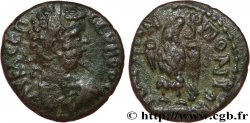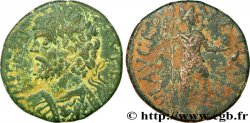bpv_173884 - SEPTIMIUS SEVERUS Tetrassaria
Not available.
Item sold on our e-shop
Price : 195.00 €
Item sold on our e-shop
Price : 195.00 €
Type : Tetrassaria
Date: c. 193-211
Mint name / Town : Augusta Traiana, Thrace
Metal : copper
Diameter : 27,5 mm
Orientation dies : 6 h.
Weight : 13,10 g.
Rarity : R2
Coments on the condition:
Flan large, légèrement décentré au droit sur la légende. Beau portrait. Revers parfaitement centré et de haut relief. Patine vert foncé
Catalogue references :
Obverse
Obverse description : Tête laurée de Septime Sévère à droite (O*).
Obverse legend : AU[T L SEPTI] - SEUHROS PER (Autokratoros Lukios Septimos Seuhros Pertinax).
Obverse translation : (L’empereur Lucius Septimius Sévère Pertinax).
Reverse
Reverse description : Vue de la muraille de la cité avec trois tours.
Reverse legend : HGE SIKINNOIU KLAROU AUGOUSTHS TRAIANHS.
Reverse translation : (de Égémon Sicinius Clarus d’Augusta Traiana).
Commentary
Revers historiquement important.








 Report a mistake
Report a mistake Print the page
Print the page Share my selection
Share my selection Ask a question
Ask a question Consign / sell
Consign / sell
 Full data
Full data



